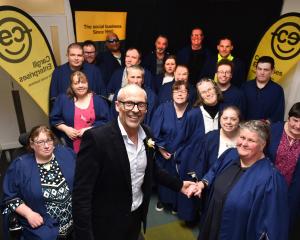Changing how educators are taught would go a long way towards addressing the inequities which deaf pupils face in our system, two education lecturers say.
Victoria University School of Linguistics and Applied Language Studies senior lecturer Dr Rachel McKee believed it was time for "major change" in the area of deaf education.
For a "long time" New Zealand Sign Language (NZSL) has not been treated as a valued resource in education.
While this attitude was changing, the majority of change was policy rather than practice based, she said.
An unacceptable reality for her was that deaf children in mainstream schools were most often taught by teacher aides who were not trained in NZSL.
"It's not acceptable. And deaf people don't think it's acceptable. It's wasting a lot of potential."
Mainstream schools in New Zealand "simply are not equipped" to aid the education of deaf children, Dr McKee said.
While it would be "unrealistic" to expect all teachers to be capable of teaching deaf children, she believed professionally trained interpreters were needed to help educate deaf children.
"It's not rocket science [and] it's standard practice in other countries."
However, cost was a major factor in the idea not becoming reality, she said.
Professional interpreters would cost a similar amount to a teacher, and teacher aides were considerably cheaper.
An alternative way to educate deaf children could be to group them together in towns or regions to pool resources and allow them to communicate with their peers, she said.
She acknowledged the recent Special Education Review would result in a reorganisation of deaf education resources, but "I don't see any real initiatives taking place around professionally trained interpreters".
University of Otago College of Education senior lecturer Dr Gill Rutherford believed more work was required by educators to remedy the situation.
"Far more needs to be done with teacher education to enable it to be part of the solution," she said.
She would like to see disability studies, including deaf education, become a compulsory aspect of teacher training with more time and resources devoted to it.
"It's an official language, as is te reo, and so we need to offer far more than a brief glimpse at it."
She could understand the "isolation" and "frustration" deaf children and their families must feel due to the lack of access to NZSL.
"My sense, generally, is that there are still significant inequities in terms of our disabled students and deaf students enacting their right to education.
"Many schools do fantastic things. So much depends on the teacher and principal and how they think of the rights of disabled and deaf children," she said.
Ministry of Education special education deputy secretary Nicholas Pole said the Ministry recognised access to education for sign language users was a "unique challenge", as educational achievement was aligned with literacy and numeracy based on spoken languages.
However, about $30 million a year was provided to 2600 deaf and hearing-impaired children through special education resourcing streams, and about 200 full-time equivalent professional staff were employed for deaf and hearing-impaired pupils.
Through funding streams, schools are able to hire specialist services, including interpreters.
"Decisions about what will be provided for individual children rests with schools, who work with parents and staff to find the mix of specialist skills that will best suit a child's learning needs," he said.
Mr Pole also noted that all teachers were able to acquire NZSL as part of their professional development.













